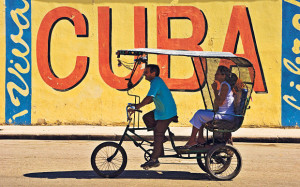
After President Obama’s historic visit to the Cuba there seems to be a feeling of optimist in the air in Havana where citizens are hoping that with normalization of relations between the United States and Cuba will lead to a better economy and better way of life. American tourist have taken advantage of some of the sanctioning on travel being lifted which has resulted in some uptick in the Cuban economy. Manuel Cruz of Havana agrees and he envisions planeloads of Americans arriving daily resulting in more money in everyone’s pockets. When this happens Cubans won’t have a need to leave the country, “it’ll be the reverse: Migration will be to Cuba.”
During the president’s trip last week he told the Cuban people that their future is in their hands. “What change come will depend upon the Cuban people,” said the president then adding, “We will not impose our political or economic system on you.” A day later the U.S. State Department announced a $753,989 community internship program targeting “young emerging leaders from Cuban civil society.” Some like Emilio Paz question the flip flop, “Are the State Department and the White House on the same wavelength? Do they coexist in the same government? The same city? The same constellation?” After which Paz added, “”Forgive us if we’re skeptical or even dubious about this million-dollar plan to decide or even help decide Cuba’s destiny. It looks suspiciously like a Trojan horse.”
On Monday, Fidel Castro published a scathing piece on Cuba’s official newspaper Granma excoriating Obama for his speech, stating that Cubans were at risk of an “infarto” (heart attack) after Obama spoke of ending this Cold War and starting over in good faith. Castro adding that despite a “ruthless embargo that has lasted over 60 years,” and deaths and violence from “mercenary” attacks the country had worked to eliminate the vestiges of racism. He concluded by saying “we don’t need the imperio (empire) to give us anything,” saying Cuba is capable of producing the food and material goods it needs.
Some Cuban dissident leader have estimated that authorities had arrested and later released around 450 to 500 democracy activists in the days before Obama’s visit. Though President Obama and Raul Castro differ deeply over human rights Obama did say that, “I believe citizens should be free to speak their mind without fear, to organize, and to criticize their government, and to protest peacefully, and that the rule of law should not include arbitrary detentions of people who exercise those rights.” Castro simply responded to reporters that Cuba defends “civil, political, economic, social and cultural rights we oppose political manipulation and double standards in the approach to human rights.” Castro added that Cuba does not hold political prisoners and told reporters to give him a list of political prisoners and he would have them release “immediately,” before the end of the day.

Recent Comments